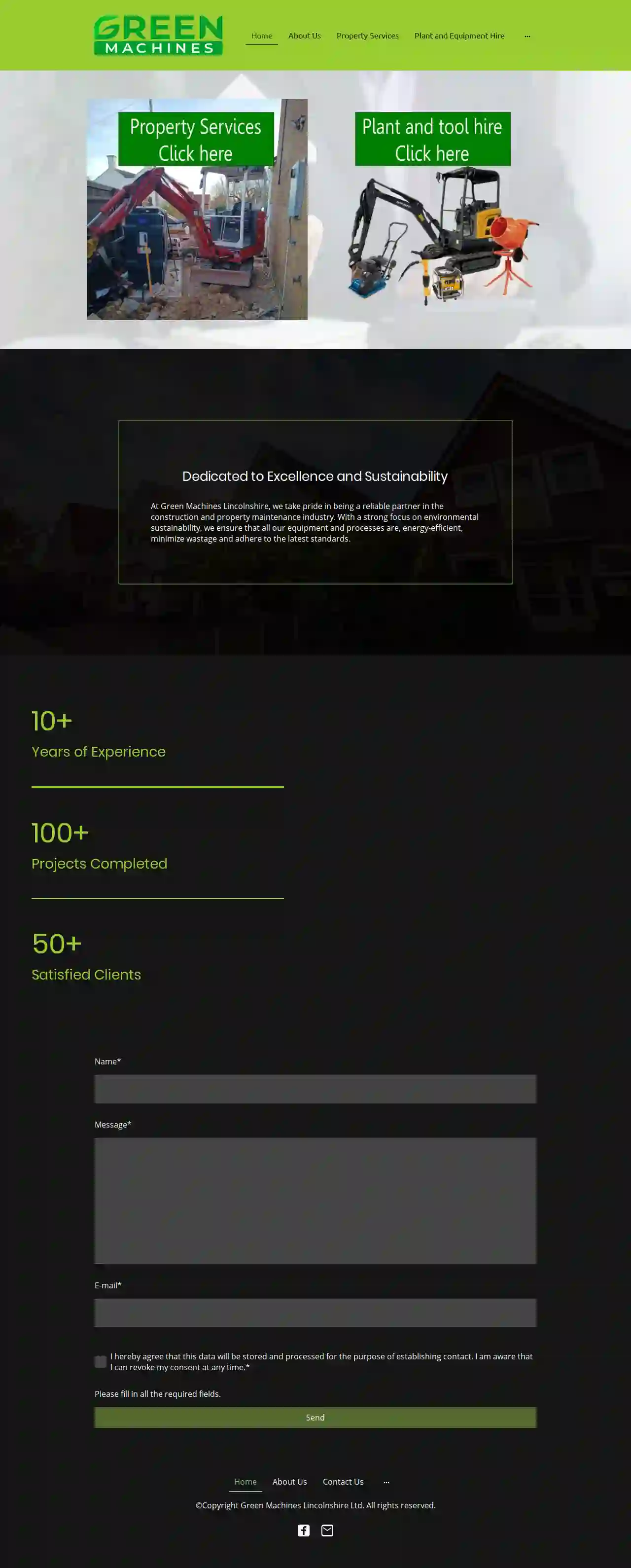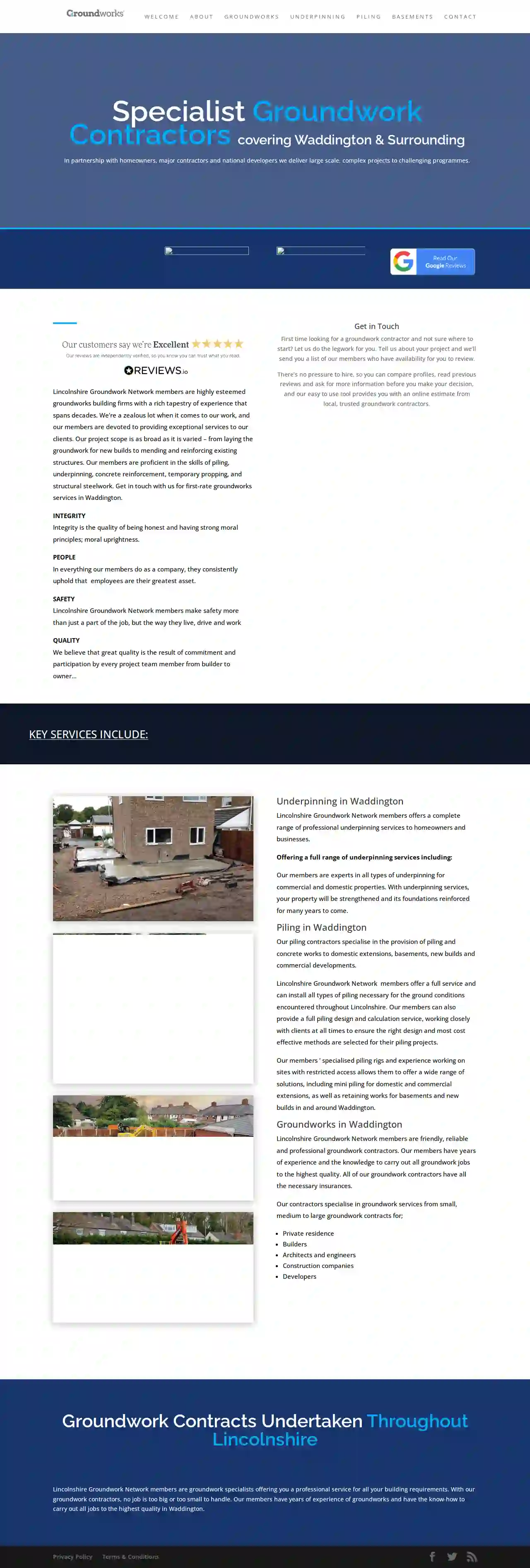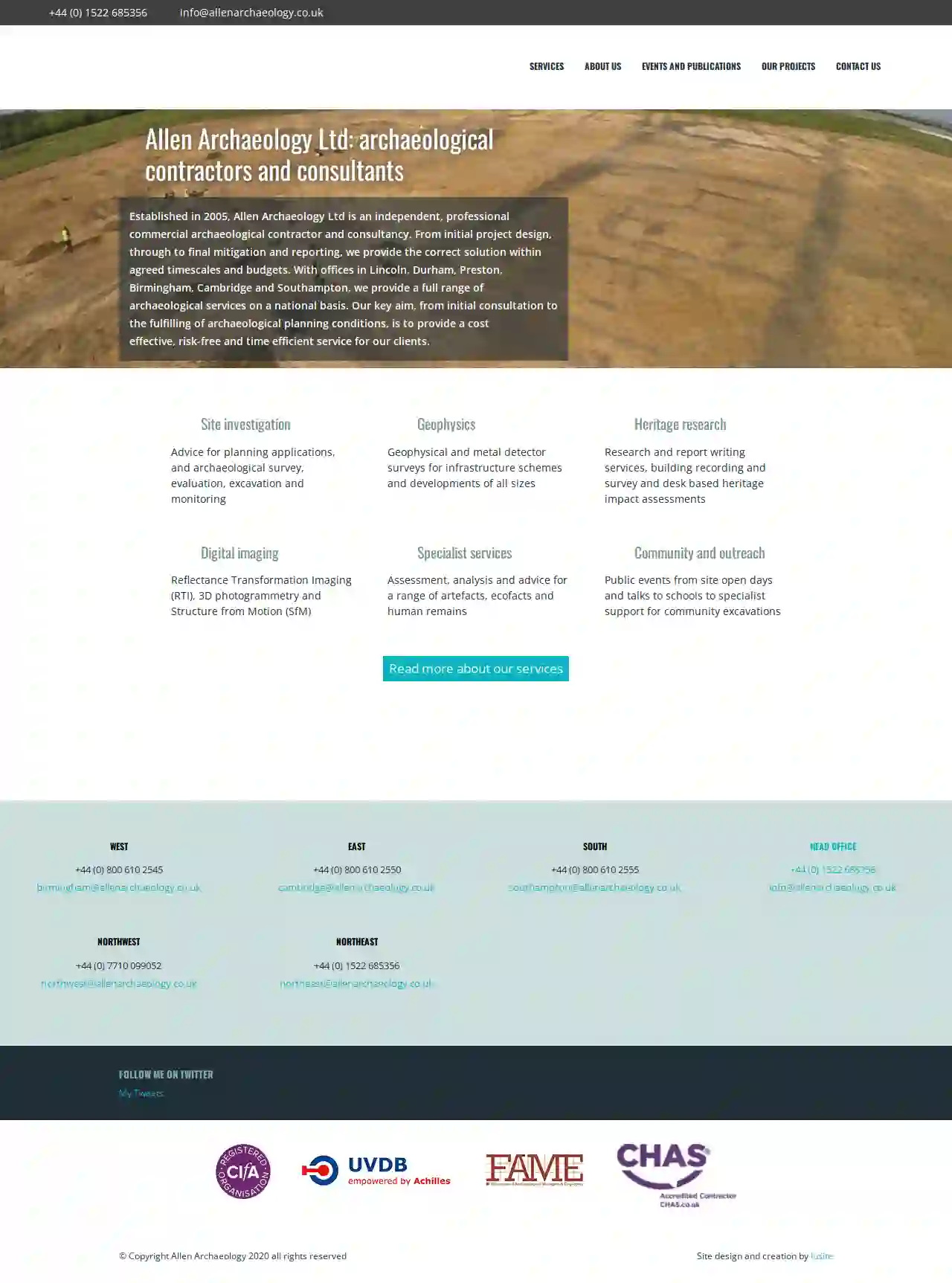Excavation Contractors Lincoln
Find top Land Excavation in Lincoln
Receive up to 3 Excavation Contractors quotes for your project today! Compare profiles, reviews, accreditations, portfolio, etc... and choose the best service.
- Pu
Purple Blue Dot Ltd
1Lincoln, GB- Services
- Why Us?
Get Quote 
Green Machines Lincolnshire
51 reviewsSouth Kyme, LN4 4AD, GBGreen Machines Lincolnshire At Green Machines Lincolnshire, we take pride in being a reliable partner in the construction and property maintenance industry. With a strong focus on environmental sustainability, we ensure that all our equipment and processes are energy-efficient, minimize wastage and adhere to the latest standards.
- Services
- Why Us?
- Our Team
- Gallery
Get Quote- M
M R PARKER Builders
52 reviewsLincoln, GB- Services
- Why Us?
Get Quote - Wa
Warren Vale Construction Ltd
1Lincoln, GB- Services
- Why Us?
Get Quote 
M & R Kirk Groundworks Ltd
1Lincoln, GBSpecialist Groundwork Contractors covering Waddington & Surrounding In partnership with homeowners, major contractors and national developers we deliver large scale, complex projects to challenging programmes. Lincolnshire Groundwork Network members are highly esteemed groundworks building firms with a rich tapestry of experience that spans decades. We’re a zealous lot when it comes to our work, and our members are devoted to providing exceptional services to our clients. Our project scope is as broad as it is varied – from laying the groundwork for new builds to mending and reinforcing existing structures. Our members are proficient in the skills of piling, underpinning, concrete reinforcement, temporary propping, and structural steelwork. Get in touch with us for first-rate groundworks services in Waddington. Our Values INTEGRITY Integrity is the quality of being honest and having strong moral principles; moral uprightness. PEOPLE In everything our members do as a company, they consistently uphold that employees are their greatest asset. SAFETY Lincolnshire Groundwork Network members make safety more than just a part of the job, but the way they live, drive and work QUALITY We believe that great quality is the result of commitment and participation by every project team member from builder to owner… Get in Touch First time looking for a groundwork contractor and not sure where to start? Let us do the legwork for you. Tell us about your project and we’ll send you a list of our members who have availability for you to review. There’s no pressure to hire, so you can compare profiles, read previous reviews and ask for more information before you make your decision, and our easy to use tool provides you with an online estimate from local, trusted groundwork contractors.
- Services
- Why Us?
- Gallery
Get Quote- Ar
Archaeological Project Services
51 reviewsLincoln, GB- Services
- Why Us?
Get Quote 
Allen Archaeology Ltd
4.710 reviewsLincoln, GBAllen Archaeology Ltd: archaeological contractors and consultants Established in 2005, Allen Archaeology Ltd is an independent, professional commercial archaeological contractor and consultancy. We provide the right solution within agreed timescales and budgets, from initial project design to final mitigation and reporting. With offices in Lincoln, Durham, Preston, Birmingham, Cambridge, and Southampton, we offer a full range of archaeological services nationwide. Our primary goal, from initial consultation to fulfilling archaeological planning conditions, is to provide our clients with a cost-effective, risk-free, and time-efficient service.
- Services
- Why Us?
- Accreditations
- Gallery
Get Quote- Fe
Fenland Drives and Patios
57 reviewsLincoln, GB- Services
- Why Us?
Get Quote - La
Land Excavating & Demolition, LLC
3.810 reviewsLincoln, GB- Services
- Why Us?
Get Quote - Be
Beechwood Plant Hire
1Lincoln, GB- Services
- Why Us?
Get Quote
Over 11,537+ Excavation Contractors registered
Our excavation contractors operate in Lincoln and beyond!
ExcavationHQ has curated and vetted Top Excavation Contractors near Lincoln. Find a trustworthy contractor today.
Frequently Asked Questions About Excavation Contractors
- Project Size and Scope: Larger, more complex excavations naturally take longer.
- Soil Conditions: Rocky or challenging soil types can slow down progress.
- Site Accessibility: Limited access might require more time for maneuvering equipment and hauling materials.
- Weather: Inclement weather can cause delays.
- Permitting and Inspections: Waiting for permits or inspections can extend the timeline.
- Clearly Define the Scope: Outline the project's goals, including the excavation area, depth, grade, and intended use.
- Obtain Necessary Permits: Research and acquire any required permits from your local authorities.
- Mark Utility Lines: Contact your utility companies to locate and mark underground utilities to prevent damage.
- Communicate with Neighbors: Inform your neighbors about the project's timeline and potential noise or disruptions.
- Prepare the Site: Clear any obstacles, such as vegetation, furniture, or structures, from the excavation area.
- Discuss Safety Protocols: Review safety procedures with the contractor to ensure a safe work environment.
How long does an excavation project take?
What is the difference between cut and fill excavation?
Cut: Involves excavating soil from an area where the existing grade is higher than the desired grade.
Fill: Refers to using the excavated soil ('cut' material) to raise the grade in an area where the existing grade is lower than desired.
This method minimizes the need to import or export soil, reducing costs and environmental impact. It's commonly used for site preparation, road construction, and landscaping.
What should I do before excavation starts?
What is the difference between topsoil and subsoil?
Topsoil: The uppermost layer, typically rich in organic matter, nutrients, and microorganisms. It's essential for plant growth and is often darker in color.
Subsoil: The layer beneath the topsoil, containing less organic matter and generally denser. It provides support for roots but is less fertile than topsoil.
During excavation, topsoil is often removed and preserved separately for later use in landscaping, while subsoil is typically used for backfilling or other less demanding applications.
How long does an excavation project take?
- Project Size and Scope: Larger, more complex excavations naturally take longer.
- Soil Conditions: Rocky or challenging soil types can slow down progress.
- Site Accessibility: Limited access might require more time for maneuvering equipment and hauling materials.
- Weather: Inclement weather can cause delays.
- Permitting and Inspections: Waiting for permits or inspections can extend the timeline.
What is the difference between cut and fill excavation?
Cut: Involves excavating soil from an area where the existing grade is higher than the desired grade.
Fill: Refers to using the excavated soil ('cut' material) to raise the grade in an area where the existing grade is lower than desired.
This method minimizes the need to import or export soil, reducing costs and environmental impact. It's commonly used for site preparation, road construction, and landscaping.
What should I do before excavation starts?
- Clearly Define the Scope: Outline the project's goals, including the excavation area, depth, grade, and intended use.
- Obtain Necessary Permits: Research and acquire any required permits from your local authorities.
- Mark Utility Lines: Contact your utility companies to locate and mark underground utilities to prevent damage.
- Communicate with Neighbors: Inform your neighbors about the project's timeline and potential noise or disruptions.
- Prepare the Site: Clear any obstacles, such as vegetation, furniture, or structures, from the excavation area.
- Discuss Safety Protocols: Review safety procedures with the contractor to ensure a safe work environment.
What is the difference between topsoil and subsoil?
Topsoil: The uppermost layer, typically rich in organic matter, nutrients, and microorganisms. It's essential for plant growth and is often darker in color.
Subsoil: The layer beneath the topsoil, containing less organic matter and generally denser. It provides support for roots but is less fertile than topsoil.
During excavation, topsoil is often removed and preserved separately for later use in landscaping, while subsoil is typically used for backfilling or other less demanding applications.